By far the most spectacular of all the events, the Kumbh Mela is a religious festival that occurs once every 12 years, and is celebrated in four major pilgrim centres around the country. In Maharastra, the festival is held inTrimbakeshwar, Nashik. The Nashik Kumbh Mela is generally acknowledged to be the most sacred of all the festivals.
 In Kruta Yuga, Durwas Rishi saw Indra – the King of Gods – sitting on elephant Airawat. Durwas was pleased to see Indra and presented him a chain. However Indra did not accept the present . It fell down and was trodden by elephant Airawat. Durwas Rishi got upset due to this and cursed Indra. As an effect of the curse, all Gods lost their powers and had to often lose a battle against Danavas (Demons). So all Gods including Brahmadeva surrendered themselves to God Vishnu to get back their power. Vishnu suggested them to approach Danavas and persuade them to perform Samudra Manthana (churning of the sea). He said Samudra Manthana will bring out Amruta , which will bring back your power and you will not be efeated by Danavas. So Samudra Manthana was carried out.
In Kruta Yuga, Durwas Rishi saw Indra – the King of Gods – sitting on elephant Airawat. Durwas was pleased to see Indra and presented him a chain. However Indra did not accept the present . It fell down and was trodden by elephant Airawat. Durwas Rishi got upset due to this and cursed Indra. As an effect of the curse, all Gods lost their powers and had to often lose a battle against Danavas (Demons). So all Gods including Brahmadeva surrendered themselves to God Vishnu to get back their power. Vishnu suggested them to approach Danavas and persuade them to perform Samudra Manthana (churning of the sea). He said Samudra Manthana will bring out Amruta , which will bring back your power and you will not be efeated by Danavas. So Samudra Manthana was carried out.
 One of the many precious things that arose from the depths of the troubled waters was a pot of nectar (Amrit Kumbh). Lord Vishnu, disguising himself as an enchantress ( Mohini), seized the nectar from the demons. While fleeing from the evil ones, Lord Vishnu passed the nectar on to his winged mount, Garuda. The demons finally caught up with Garuda and in the ensuing struggle, a few drops of the precious nectar fell on Allahabad, Nashik, Hardwar and Ujjain. Since then, the Kumbh Mela has been held in all these places, every 12 years.
One of the many precious things that arose from the depths of the troubled waters was a pot of nectar (Amrit Kumbh). Lord Vishnu, disguising himself as an enchantress ( Mohini), seized the nectar from the demons. While fleeing from the evil ones, Lord Vishnu passed the nectar on to his winged mount, Garuda. The demons finally caught up with Garuda and in the ensuing struggle, a few drops of the precious nectar fell on Allahabad, Nashik, Hardwar and Ujjain. Since then, the Kumbh Mela has been held in all these places, every 12 years.
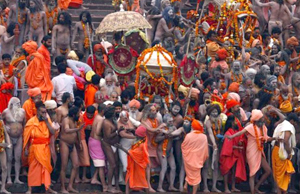 Another story is that once all the Teerthas went to Adinath Bhagwan Shankara . Following Bhagwan Shankara’s order they had been to Mrutyuloka (earth) to save sinners on earth. Teerthas absolved the sinners on the earth, but were themselves saturated with others’ sins . They requested Bhagwan Shankara to free themselves from sins. Shankara asked them to go and live in solitude for one year at the bank of river Godavari. Shankara promised the Teerthas that he himself, with all other Gods will also stay with them . After taking bath in the sacred water of Godavari, they will be free from the sins.
Another story is that once all the Teerthas went to Adinath Bhagwan Shankara . Following Bhagwan Shankara’s order they had been to Mrutyuloka (earth) to save sinners on earth. Teerthas absolved the sinners on the earth, but were themselves saturated with others’ sins . They requested Bhagwan Shankara to free themselves from sins. Shankara asked them to go and live in solitude for one year at the bank of river Godavari. Shankara promised the Teerthas that he himself, with all other Gods will also stay with them . After taking bath in the sacred water of Godavari, they will be free from the sins.
Hence during the Kumbha Mela a dip in Godavari river has attained a great importance.
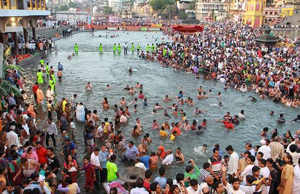 In Shiva Purana there is a story explaining the importance of Sinhastha Kumbha Mela. Gautama Rishi got salvation of his kumbhmelacow-killing sin from Lord Shankara after a long penance. Then the river Ganges descended down on the earth. After some time she wanted to go back to her home place. However the Rishis and Gods gathered there and requested her to stay back on the earth for the prosperity of the earth. She agreed to stay back only after taking a promise from Lord Shankara that all the Rishis present there and all Gods will stay with her. Then only she will stay back. Gods and Rishis promised her that during the period, when Jupiter and Sun will be in the zodiac sign Leo (Simha Rashi), they will all stay on the earth.
In Shiva Purana there is a story explaining the importance of Sinhastha Kumbha Mela. Gautama Rishi got salvation of his kumbhmelacow-killing sin from Lord Shankara after a long penance. Then the river Ganges descended down on the earth. After some time she wanted to go back to her home place. However the Rishis and Gods gathered there and requested her to stay back on the earth for the prosperity of the earth. She agreed to stay back only after taking a promise from Lord Shankara that all the Rishis present there and all Gods will stay with her. Then only she will stay back. Gods and Rishis promised her that during the period, when Jupiter and Sun will be in the zodiac sign Leo (Simha Rashi), they will all stay on the earth.
In later years, it is said, acknowledging importance of Kumbha Mela Lord Rama with his Guru Kashyap stayed and lived for one year in Trimbakeshwar. During this period he performed all the religious rites like yatra, shraddha etc near Kushavarta.
Amrut had to be saved from Danavas. So Gods had to hide it at different places – Swargalok, Mrutyulok and Patallok. Gods were on Mrutyulok (earth) for twelve days. Gods twelve days are equal to 12 years for Mrutyulok . Thus Gods were on earth for 12 years with Amrut. Hence every 12 years Kumbha Mela is celebrated at the four places, where a few drops of Amrut had fallen.
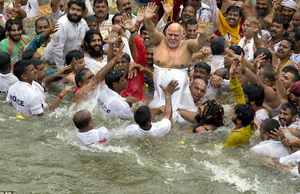 Kumbha Mela is a mammoth fair where saints and devotees gather. Kumbha Mela is celebrated at the aforesaid four places depending on the positions of planets and stars. Recognizing the importance of the Sinhastha Kumbha Mela Shri Shankaracharya appealed the disciples of his Vaidik Dharma to assemble at the time of Sinhastha Kumbha Mela. Following his appeal, till now devotees, pilgrims, and people of various sects and religions gather together for Kumbha Mela.
Kumbha Mela is a mammoth fair where saints and devotees gather. Kumbha Mela is celebrated at the aforesaid four places depending on the positions of planets and stars. Recognizing the importance of the Sinhastha Kumbha Mela Shri Shankaracharya appealed the disciples of his Vaidik Dharma to assemble at the time of Sinhastha Kumbha Mela. Following his appeal, till now devotees, pilgrims, and people of various sects and religions gather together for Kumbha Mela.
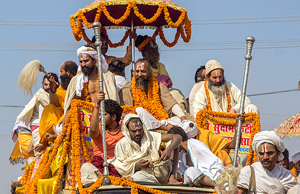 There are different dwelling places for different sects. They are called “Akhada”. The names of these Akhadas are – Shree Niranjani , Shree Junadatta (Bhairav),Shree Mahanirvani, Shree Atal, Shree Avahana, Shree Anand, Shree Pancha Agni, Shree Nathpanthi Gorakhnath, Shree Vaishnav Bairagi, Shree Udasini Panchayati Bada, Shree Udasini Naya, Shree Nirmal Panchayati etc. They have been established at different times and worship their own deity.
There are different dwelling places for different sects. They are called “Akhada”. The names of these Akhadas are – Shree Niranjani , Shree Junadatta (Bhairav),Shree Mahanirvani, Shree Atal, Shree Avahana, Shree Anand, Shree Pancha Agni, Shree Nathpanthi Gorakhnath, Shree Vaishnav Bairagi, Shree Udasini Panchayati Bada, Shree Udasini Naya, Shree Nirmal Panchayati etc. They have been established at different times and worship their own deity.
Leaders of the different sects have arrived at a consensus to follow a specific sequence for taking bath. E.g. In Haridwar Mela, Niranjani Gosawi will take bath first and then Nirwani Gosawi will bathe. In Trimbakeshwar, first Niranjani Gosawi will take bath and after they leave Kushawarta Teertha, Nirvani Gosawi will take bath . After them the old Udasee sadhu followed by new Udasee Sadhus will take bath.
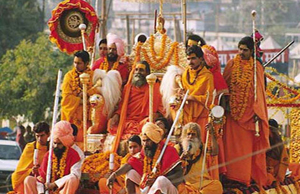 The Nashik Kumbh Mela is a mammoth affair with over three and a half million people attending it. Thousands of Sadhus and holy men and millions of pilgrims immerse themselves in the holy Ramkund and Kushavarta reservoirs. The peak festival days are August 14 and 25 and September 8 and 20. During the Kumbha Mela, Nashik City and Trimbakeshwar are in a fantastic festive mood. The festive and religious mood makes people get away from their daily chores and experience the spiritual ecstacy.
The Nashik Kumbh Mela is a mammoth affair with over three and a half million people attending it. Thousands of Sadhus and holy men and millions of pilgrims immerse themselves in the holy Ramkund and Kushavarta reservoirs. The peak festival days are August 14 and 25 and September 8 and 20. During the Kumbha Mela, Nashik City and Trimbakeshwar are in a fantastic festive mood. The festive and religious mood makes people get away from their daily chores and experience the spiritual ecstacy.